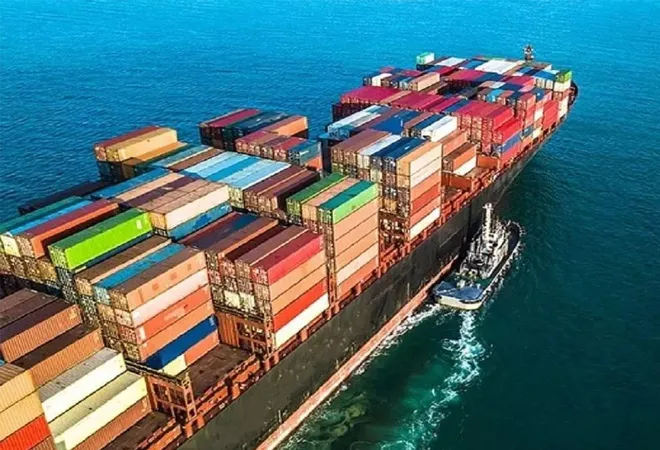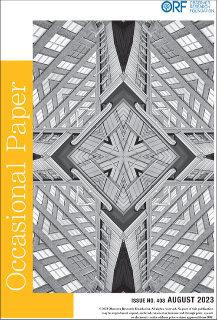
India’s new Foreign Trade Policy (FTP) announced by Minister of Commerce, Shri Piyush Goyal, which came into effect from 1April 2023, seeks to integrate India further into global value chains and to make India an export hub.
In light of the COVID-19 pandemic and the “volatile geo-political scenario till 31.03.2023”, the previous Foreign Trade Policy (2015-20) was extended. The new FTP is a shift from an incentive-based approach and creates an enabling ecosystem for exporters, which is a move in line with India’s vision of becoming “Atmanirbhar” (self reliant).
Broadly, the FTP lays great emphasis on trade facilitation through technology and digitisation, seeks to promote e-commerce, and aims to facilitate exports through various schemes and measures. While the FTP generally reflects India’s ambition to become an export hub and increase its share in global value chains, the FTP’s emphasis on e-commerce and ‘Local goes Global’ also highlights the inclusive approach of the current policy.
The new FTP is a shift from an incentive-based approach and creates an enabling ecosystem for exporters, which is a move in line with India’s vision of becoming “Atmanirbhar” (self reliant).
The new section on ‘Promoting Cross Border Trade in Digital Economy’ gives a fillip to e-commerce exports. It does so through various measures, including extending all FTP benefits to e-commerce exports, increasing the value limit for exports through couriers to INR1,000,000 per consignment, promoting e-commerce through the postal routes, and handholding and outreach schemes to promote e-commerce exports.
India’s e-commerce market is one of the largest markets in the world and is expected to
grow further in the coming years. This is a result of a combination of factors including increased internet and smartphone penetration and simplified payment systems. E-commerce exports, however, still
account for only a fraction of India’s total goods exports. The FTP 2023 looks to change this and increase India’s e-commerce exports by enabling vendors to access the international markets.
The policy proposes to create E-Commerce Export Hubs (ECEHs), which would act as a centre for favourable business infrastructure and facilities for cross-border e-commerce activities. These hubs would provide the necessary infrastructure for exports, and also connect to and leverage the services of the nearest logistics hubs.
To access these facilities and benefit from these initiatives, the government aims to increase awareness by conducting outreach activities and taking measures for skill development and capacity building in partnership with other government authorities and knowledge partners.
Most notably, the FTP also aims to promote e-commerce through postal routes. It aims to operationalise ‘Dak Niryat Kendras’ to “work in a hub-and-spoke model with Foreign Post Offices (FPOs) to facilitate cross-border e-commerce and to enable artisans, weavers, craftsmen, MSMEs in the hinterland and land-locked regions to reach international markets”. This model will allow vendors to export from areas that would be normally excluded in the logistics chains.
The policy proposes to create E-Commerce Export Hubs (ECEHs), which would act as a centre for favourable business infrastructure and facilities for cross-border e-commerce activities.
E-commerce platforms for export can serve as a democratised marketplace that allows small vendors, MSMEs, and local artisans to access international markets and retain higher profit margins. The FTP 2023 approaches digitally-enabled cross-border trade in an inclusive manner and seeks to make small players part of India’s exports.
Second, in the spirit of ‘Local goes Global’ and ‘Vocal for Local’, the section on ‘Developing Districts as Export Hubs’ aims to “galvanise districts of the country to become export hubs by identifying products and services with export potential in the district”.
It proposes to do so by creating District Export Promotion Committees (DEPCs) and creating District Export Action Plans for each district, which can be monitored online.
Identifying export of products/services at the district level and conducting outreach activities, including buyer-seller meets, trade fairs, and workshops, can onboard a greater number of exporters. The process of identifying and prioritising two to three high potential products/services from the districts can also increase competition and innovation.
These interventions at the district level can generate awareness and help small vendors to access bigger markets. While some districts in India are already known for their exports, the new measures will widen the scope of outreach and potentially onboard previously excluded exporters.
Lastly, the FTP has declared four new ‘Towns of Export Excellence’ (TEE) with the objective of moving up the value chain and tapping into new markets. These four new TEEs are in addition to the already existing 39 towns of export excellence. The new towns are:
| Town of Export Excellence |
Product Category |
| Faridabad |
Apparel |
| Moradabad |
Handicrafts |
| Mirzapur |
Handmade Carpet and Dari |
| Varanasi |
Handloom and Handicraft |
Under this scheme, (i) recognised associations of units are provided financial assistance under the Market Access Initiative Scheme on a priority basis, for export promotion projects for marketing, capacity building and technological services, and to visit various trade exhibitions/fairs for exploring more marketing avenues; (ii) Common Service Providers in these areas shall be entitled for authorisation under the EPCG scheme. These added benefits will further promote local handicrafts and industry and consequently support the livelihoods of artisans.
The above policies highlight the efforts of the government to reach out to smaller vendors, businesses, and local artisans. As India targets an annual export of a
trillion dollars of goods and services by 2030, exports from smaller vendors and remote districts will also contribute towards this growth. Promoting exports from smaller businesses and artisans will not only have positive cascading effects on the economy but also on the livelihoods of people.
Overall, the FTP’s goal to make India a reliable and trusted trading partner, with the vision of increasing the country’s share in the global supply chain in exports, is propelled by government schemes for larger exports along with positive interventions for small-scale vendors and businesses. By including and empowering local vendors, the FTP seeks to make every seller a part of India’s export story.
The views expressed above belong to the author(s). ORF research and analyses now available on Telegram! Click here to access our curated content — blogs, longforms and interviews.



 India’s new Foreign Trade Policy (FTP) announced by Minister of Commerce, Shri Piyush Goyal, which came into effect from 1April 2023, seeks to integrate India further into global value chains and to make India an export hub.
In light of the COVID-19 pandemic and the “volatile geo-political scenario till 31.03.2023”, the previous Foreign Trade Policy (2015-20) was extended. The new FTP is a shift from an incentive-based approach and creates an enabling ecosystem for exporters, which is a move in line with India’s vision of becoming “Atmanirbhar” (self reliant).
Broadly, the FTP lays great emphasis on trade facilitation through technology and digitisation, seeks to promote e-commerce, and aims to facilitate exports through various schemes and measures. While the FTP generally reflects India’s ambition to become an export hub and increase its share in global value chains, the FTP’s emphasis on e-commerce and ‘Local goes Global’ also highlights the inclusive approach of the current policy.
India’s new Foreign Trade Policy (FTP) announced by Minister of Commerce, Shri Piyush Goyal, which came into effect from 1April 2023, seeks to integrate India further into global value chains and to make India an export hub.
In light of the COVID-19 pandemic and the “volatile geo-political scenario till 31.03.2023”, the previous Foreign Trade Policy (2015-20) was extended. The new FTP is a shift from an incentive-based approach and creates an enabling ecosystem for exporters, which is a move in line with India’s vision of becoming “Atmanirbhar” (self reliant).
Broadly, the FTP lays great emphasis on trade facilitation through technology and digitisation, seeks to promote e-commerce, and aims to facilitate exports through various schemes and measures. While the FTP generally reflects India’s ambition to become an export hub and increase its share in global value chains, the FTP’s emphasis on e-commerce and ‘Local goes Global’ also highlights the inclusive approach of the current policy.
 PREV
PREV


